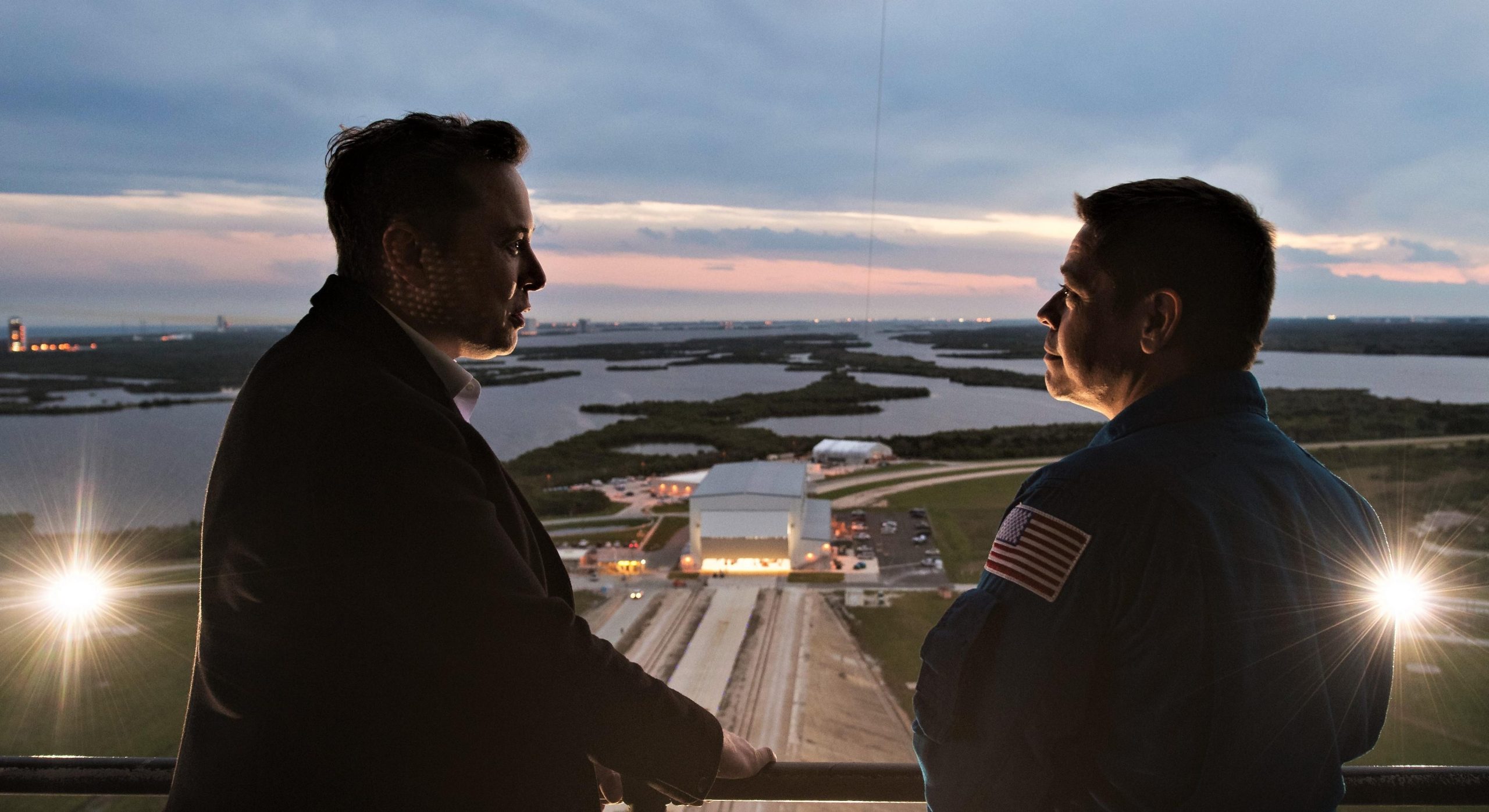
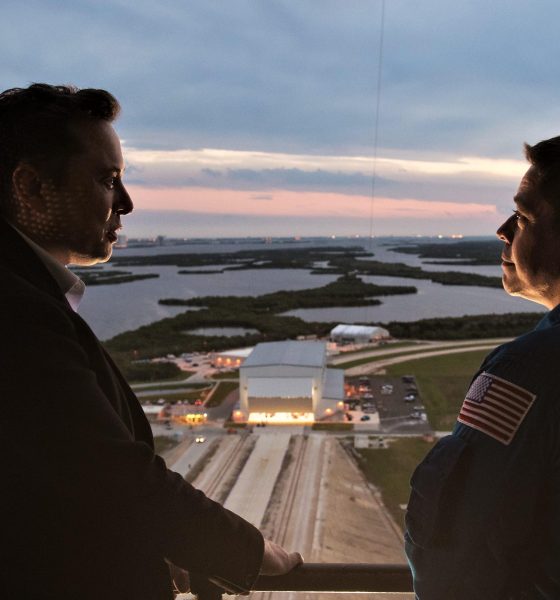
Lifestyle
Elon Musk and the electric (VTOL supersonic jet) plane that could
Elon Musk is a lot of things to a lot of people, but there’s something very interesting about him that drives most others: If he thinks something is worth improving, there’s more than a coin’s toss of a chance he’s going to make a go of it.
Now, Musk is a fantastically creative guy and all, but I’m not here to shower him with accolades (today anyhow). I’m setting the stage to discuss the next so-called improbable thing he might take on in the near future.
“I have an idea for a vertical takeoff and landing supersonic jet.”
— Elon Musk, every time the subject of electric planes comes up, to include almost never using the VTOL abbreviation for some reason that’s probably very unimportant. —
At this point, I’ve seen a few video montages of our serial entrepreneur saying this very thing word-for-word without fail to the point that it’s amusing. Wait, that’s not totally correct. In Musk’s Iron Man 2 cameo, he tells the (fake) Tony Stark that he (the real Tony Stark) has an idea for (just) an electric jet. I’m not sure if I cringe at the scene because it’s so awkward or because he went off-script on the plane’s usual description, but I digress.
Following Musk’s lead, the Tesla crowd has jumped on this electric plane idea a few times now, hashing out the particular advantages and hiccups that would be involved in battery-electric flight. It turns out that, along with reductions in carbon emissions (air travel is estimated to globally contribute 12% of the transportation-based carbon being pumped into the atmosphere), electric planes are fairly cost-effective even with the current state of battery technology.
Swapping Jet A (kerosine plane fuel) for a battery can bring a reduction of 60-80% in operating costs, 80% lower emissions and noise, and a 40% reduction in runway needs (not including VTOL), according to numbers crunched by one of the startups in the nascent electric aviation industry, Zunum Aero. Also, around 75% of all flights are domestic, and out of those, around half are under 700 miles and 20% are under 350 miles. Those mileage stats work out very well for current electric aircraft hopefuls as their planes have proposed travel distances of around 350-700 miles.

A few companies have thrown their hats in the ring along with Zunum Aero such as Airbus/Siemens, Eviation, and BYE Aerospace, but one has specifically cited Tesla as an inspiration for its business model. Los Angeles-based Wright Electric announced plans last year to bring to market a 9-seat electrified aircraft with a range of at least 340 miles, covering a distance of nearly 44% of all flights. CEO Jeff Engler spoke with Teslarati about Wright’s development plans last July:
“Our plan is similar to the Tesla approach, in the sense that they started with the Roadster and then scaled up to larger more mass market vehicles. Our first plane to market will be a premium aircraft meant to travel short distances with a small number of passengers… perfect for intercity flights and recreational activities like skydiving. This initial program is the springboard for development of larger longer-range aircraft.”
With so many players already on board with electric flight, the next question then becomes whether Elon Musk is still interested in developing an electric vertical takeoff and landing supersonic jet. He’s led on so much technology already, perhaps word has finally gotten out on the (global) street that it’s okay to be stubborn about making big changes where they’re needed.

He’s certainly still thinking about it at least. Last week the CEO had a discussion about the concept on Twitter (Musk’s go-to idea playground), commenting that while yes, electric planes are possible, the range is still too limited. Battery density is the hangup, and they need about 400 Wh/kg energy density or better to really be viable.
Tesla’s current battery density is about 250 Wh/kg (300 Wh/kg on a high cycle), but their recent acquisition of Maxwell Technologies could indicate some serious progress in that direction is around the corner. The new Tesla addition is known to use dry electrodes to reach higher levels of energy density and has identified a “path” to reaching 500 Wh/kg. Or in other words, Maxwell and Tesla together could make electric planes a commercially viable idea.
On Musk’s infamous sit-down with Joe Rogan last September, however, he kind of dismissed the idea for the near future. “I have a lot on my plate,” he explained on the podcast. “The electric airplane isn’t necessary right now. Electric cars are important. Solar energy is important. Stationary storage of energy is important. These things are much more important than creating an electric supersonic VTOL.”
Let’s assume for a minute that he’s definitely going to go for it. Maybe Musk gets stuck at an airport one day because his plane can’t take off thanks to a late fuel tanker delivery or something. The tweet storm we’d see might go something like…

The question then becomes what, exactly, is Musk’s idea? This talk about the technology needing energy density is great and all, but as seen with Wright Electric and similar ventures, regional air travel is doable without Tesla’s shock-jock-of-sorts guiding the way.
Musk seems hung up on the “supersonic” aspect that no one’s really talking about, but supersonic passenger jets haven’t been around since Concord waved goodbye in 2003, and sonic boom complaints are an inescapable matter of physics (as are all complaints, really). Also, I highly doubt he’s thinking air taxis, although Uber has a foot in that door and he’s taking them on with the Tesla Network eventually.
What do you think Musk has in mind? And, whatever his idea…will he actually do it? Let me know in the comments below!

Lifestyle
Tesla Model S Plaid battles China’s 1500 hp monster Nurburgring monster, with surprising results
There is just something about Tesla’s tuning and refinement that makes raw specs seem not as game-changing.
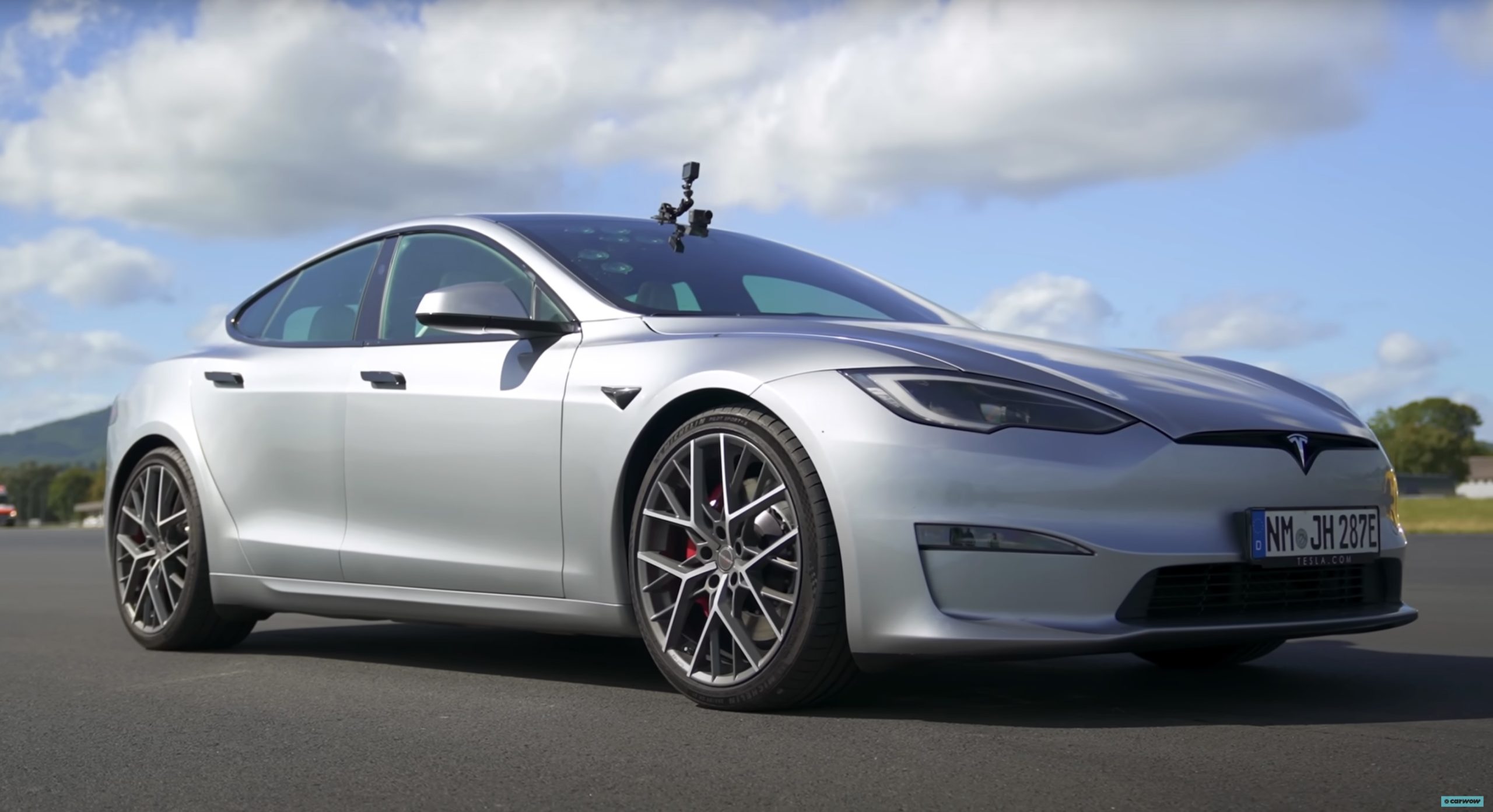
The Tesla Model S Plaid has been around for some time. Today, it is no longer the world’s quickest four-door electric sedan, nor is it the most powerful. As per a recent video from motoring YouTube channel Carwow, however, it seems like the Model S Plaid is still more than a match for some of its newer and more powerful rivals.
The monster from China
The Xiaomi SU7 Ultra is nothing short of a monster. Just like the Model S Plaid, it features three motors. It also has 1,548 hp and 1,770 Nm of torque. It’s All Wheel Drive and weighs a hefty 2,360 kg. The vehicle, which costs just about the equivalent of £55,000, has been recorded setting an insane 7:04.957 at the Nurburgring, surpassing the previous record held by the Porsche Taycan Turbo GT.
For all intents and purposes, the Model S Plaid looked outgunned in Carwow’s test. The Model S Plaid is no slouch with its three motors that produce 1,020 hp and 1,420 Nm of torque. It’s also a bit lighter at 2,190 kg despite its larger size. However, as the Carwow host pointed out, the Model S Plaid holds a 7:25.231 record in the Nurburgring. Compared to the Xiaomi SU7 Ultra’s record, the Model S Plaid’s lap time is notably slower.
Real-world tests
As could be seen in Carwow’s drag races, however, Tesla’s tech wizardry with the Model S Plaid is still hard to beat. The two vehicles competed in nine races, and the older Model S Plaid actually beat its newer, more powerful counterpart from China several times. At one point in the race, the Xiaomi SU7 Ultra hit its power limit due to its battery’s temperature, but the Model S Plaid was still going strong.
The Model S Plaid was first teased five years ago, in September 2020 during Tesla’s Battery Day. Since then, cars like the Lucid Air Sapphire and the Xiaomi SU7 Ultra have been released, surpassing its specs. But just like the Model Y ended up being the better all-rounder compared to the BYD Sealion 7 and the MG IM6, there is just something about Tesla’s tuning and refinement that makes raw specs seem not as game-changing.
Check out Carwow’s Model S Plaid vs Xiaomi SU7 drag race video below.
Lifestyle
500-mile test proves why Tesla Model Y still humiliates rivals in Europe
On paper, the BYD Sealion 7 and MG IM6 promised standout capabilities against the Model Y.
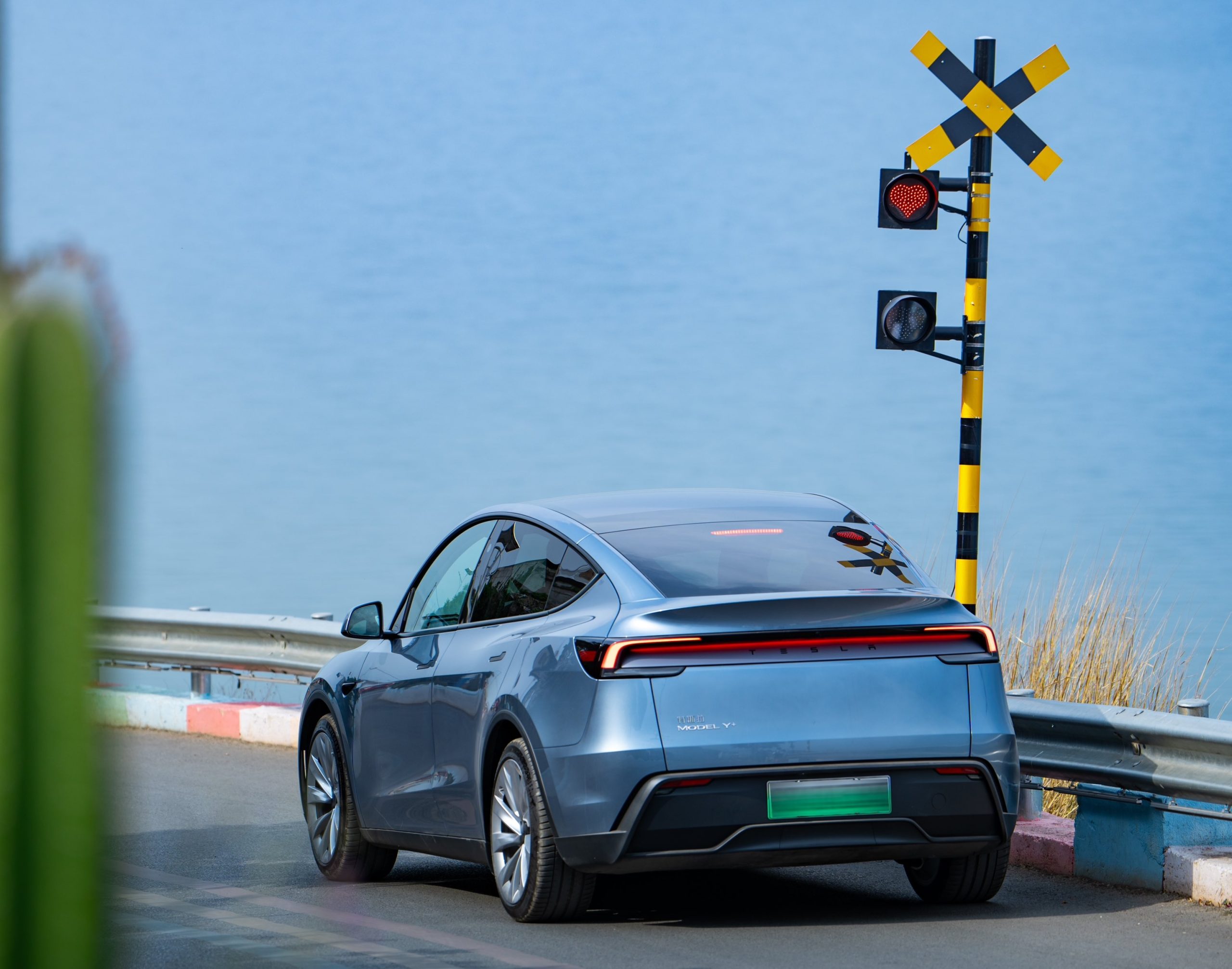
BYD is seeing a lot of momentum in Europe, so much so that mainstream media has taken every opportunity to argue that the Chinese automaker has beaten Tesla in the region. But while BYD sales this year in Europe are rising and Tesla’s registrations remain challenged, the raw capabilities of vehicles like the Model Y are difficult to deny.
This was highlighted in a 500-mile challenge by What Car? magazine, which showed that the new Tesla Model Y is more efficient, cheaper to run, and more reliable than rivals like the BYD Sealion 7, and even the nearly 400 KW-charging MG IM6.
Range and charging promises
On paper, the BYD Sealion 7 and MG IM6 promised standout capabilities against the Model Y. The Sealion 7 had more estimated range and the IM6 promised significantly faster charging. When faced with real-world conditions, however, it was still the Model Y that proved superior.
During the 500-mile test, the BYD nearly failed to reach a charging stop, arriving with less range than its display projected, as noted in a CarUp report. MG fared better, but its charging speeds never reached its promised nearly-400 kW charging speed. Tesla’s Model Y, by comparison, managed energy calculations precisely and arrived at each stop without issue.
Tesla leads in areas that matter
Charging times from 25% to 80% showed that the MG was the fastest at 17 minutes, while Tesla and BYD were close at 28 and 29 minutes, respectively. Overall efficiency and cost told a different story, however. The Model Y consumed 19.4 kWh per 100 km, compared to 22.2 for MG and 23.9 for BYD. Over the full trip, Tesla’s charging costs totaled just £82 thanks to its supercharger network, far below BYD’s £130 and MG’s £119.
What Car? Magazine’s testers concluded that despite BYD’s rapid sales growth and the MG IM6’s seriously impressive charging speeds, Tesla remains the more compelling real-world choice. The Model Y just offers stability, efficiency, and a proven charging infrastructure through its Supercharging network. And as per the magazine’s hosts, the Model Y is even the cheapest car to own among the three that were tested.
Watch What Car? Magazine’s 500-mile test in the video below.
Lifestyle
Tesla Cybertruck slapped with world’s least intimidating ticket, and it’s pure cringe
One cannot help but cringe and feel second-hand embarrassment at the idea of a person just driving around with a stack of these babies.
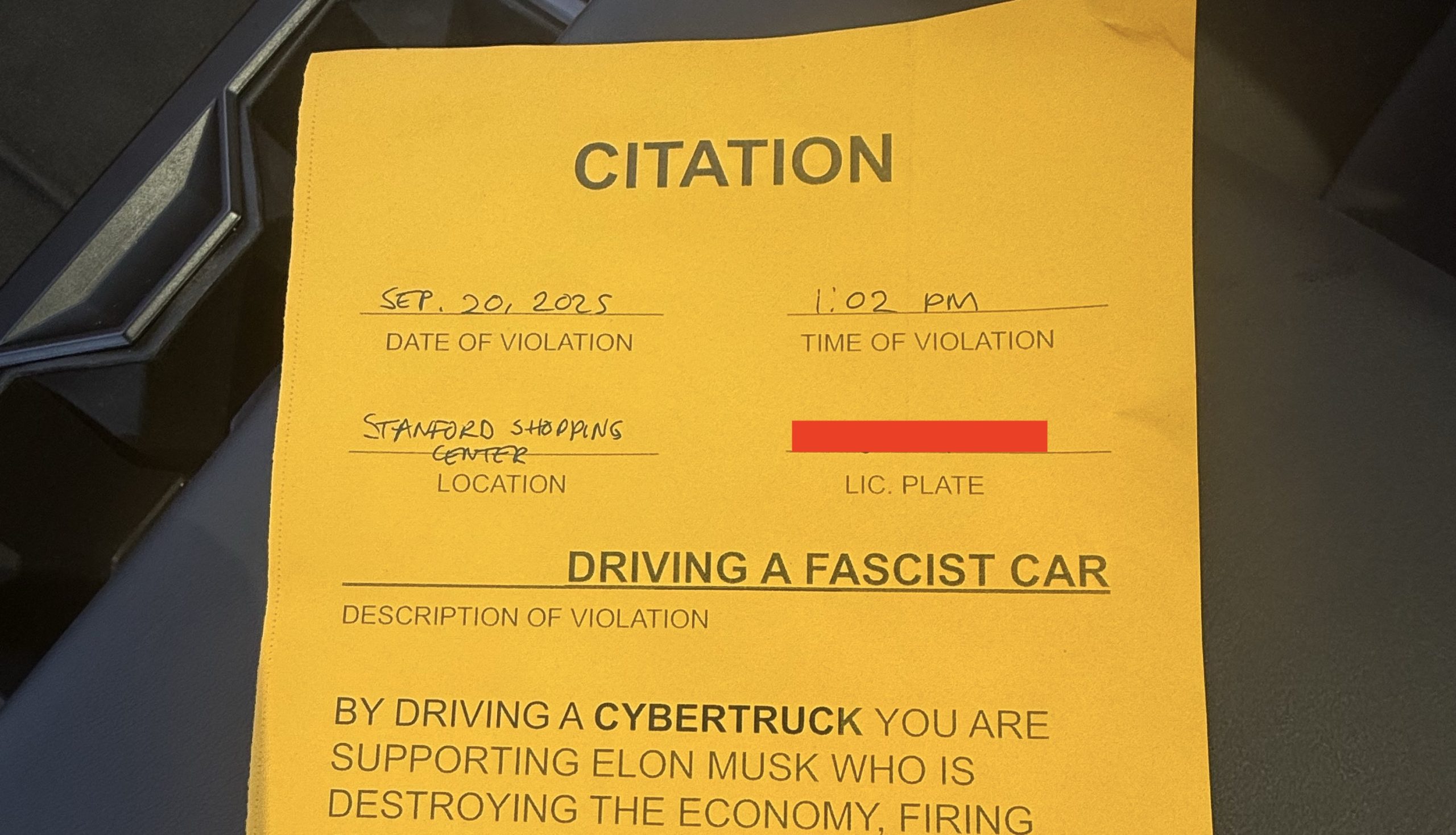
A Cybertruck parked at Stanford Shopping Center in California was recently hit with what might be the most try-hard piece of paper ever slipped under a wiper blade: a “fake citation” accusing the driver of supporting a “fascist car.”
The note, shared on X by Tesla staff program manager Ryan Torres, quickly made the rounds on X, where it quickly gained attention as an example of how not to protest.
The world’s least intimidating ticket
According to the citation, the supposed “violation” was “driving a fascist car.” The remedial action? Take the bus, call an Uber, or ride a bike. The note also dubbed Elon Musk a “chainsaw-wielding Nazi billionaire.” Now, protests against Tesla and Elon Musk have become commonplace this year, but one cannot help but cringe and feel second-hand embarrassment at the idea of a person just driving around with a stack of fake anti-Tesla/Musk citations.
Torres pointed out the irony himself in his post on X. Tesla currently employs over 140,000 Americans, and SpaceX has put the U.S. firmly back at the top of space technology. As Torres put it, maybe the person behind the world’s least intimidating ticket should “read a book on innovation before vandalizing” other people’s property.
Peak performative clownery
Not to mention that the fake ticket’s logic collapses under its own weight. EVs like the Cybertruck are literally designed to reduce emissions, not “destroy the economy.” If anything, Tesla has bolstered the United States’ economy by fueling jobs in engineering, manufacturing, and clean energy. It’s not the first time a Tesla has been the target of vandalism or politically charged notes, but this one stands out for sheer cringe value.
Torres summed it up neatly: “Peak clownery.” On that point, at least, the citation earns full marks. In a way, though, perhaps cringe fake tickets are not as bad as the literal firebombs that were being thrown at Tesla stores and cars earlier this year because some critics were gleefully misinformed about Elon Musk.








